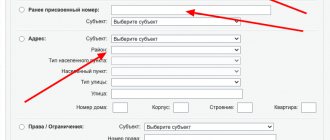Seizure of a bank account by bailiffs is a security measure introduced to force the debtor to pay the debt to the collector. Almost always, the seizure of accounts entails a forced write-off of money received in this account. The bailiff can seize the account on the basis of a ruling or after the initiation of proceedings.
The bank is also obliged to accept and fulfill the requirements of documents submitted by creditors. In the article we will tell you what consequences the seizure of a bank account entails, what a debtor can do to avoid the seizure of accounts and withholding money from them, and what types of income cannot be written off by bailiffs.
In what cases can an account be blocked and how?
Seizure of the debtor's property is a measure of forced execution of the claimant's demands (Clause 5, Part 3, Article 68 of the Law “On Enforcement Proceedings” dated October 2, 2007 No. 229-FZ).
Note! The direct collection of funds from an account should be distinguished from the seizure of property, since these measures have completely different goals.
Thus, the purpose of seizing a bank account by bailiffs is to force the official to comply with the legal request. If execution is not carried out, then the amount that the debtor could not dispose of after blocking may be collected from the account.
The right to implement the procedure is reserved for bailiffs, clause 7, part 1, art. 64 of Law 229-FZ. A ban on spending transactions is a completely justified measure, for example, in cases where the debtor does not have a regular income and does not pay off the debt voluntarily.
Seizure of accounts by bailiffs is carried out on the basis of a resolution, which is sent to the bank where the debtor has an account. If a blocking was carried out, in accordance with Part 4 of Art. 70 of Law 229-FZ, the bailiff indicates in the resolution how it can be removed.
Legal regulation
The procedure for enforcement proceedings is regulated by the provisions of No. 229-FZ. The law was finalized due to the pandemic - 5 amendments were adopted in 2020. In fact, in 2021 there is a new law in force, according to which the rights and responsibilities of bailiffs are clearly defined. Now the arrest and blocking of money in debtors’ accounts is the work and responsibility of the bank, and the bailiff only sends a decree on write-off. How does this happen?
The procedure for seizing the debtor's funds placed in bank accounts is established by Article 81 of Federal Law No. 229-FZ.
Which accounts and incoming funds cannot be seized?
Law 229-FZ (Part 3 of Article 69) directly states which accounts cannot be seized by bailiffs:
- Nominal. Its owner is one citizen, and the actual owner of the funds received by him (the beneficiary) is another. For the debts of the owner, the account cannot be arrested under any circumstances; for the debts of the beneficiary - only by court decision (Clause 2 of Article 860.5 of the Civil Code of the Russian Federation).
- Collateral, where the debtor’s funds were deposited to secure any of his obligations.
- Clearing, since it stores money that will be used to secure obligations admitted to clearing.
- Trade.
This rule provides an answer to another popular question: can bailiffs seize a brokerage account. Yes, since it is not included by the legislator in the above list as an exception.
As for the collection of funds in the account, we should not forget about the list approved by Part 1 of Art. 101 of Law 229-FZ. It contains a list of those incomes that cannot be recovered. These include some types of pensions, compensation payments from the budget, from the employer or social insurance.
Bailiffs do not check the purpose of money received in accounts, so blocking is possible in practice, and to cancel it you will have to contact the SSP.
Which banks do not cooperate with bailiffs
Federal legislation is mandatory for all banks and other financial organizations operating in the Russian Federation. This is an unconditional rule, the implementation of which is monitored by the Central Bank of the Russian Federation and the Federal Service for Financial Monitoring (Rosfinmonitoring).
Service information: in Art. 81 No. 229-FZ does not make exceptions in favor of any group of banks. The law states that banks and other credit organizations immediately execute the order of the bailiff.
Therefore, looking for a list of banks that do not seize accounts is useless. There are no such banks on the territory of the Russian Federation, since failure to comply with the requirements of federal legislation threatens the organization with revocation of its license or other types of sanctions.
How to unblock
In case of blocking of funds on the account that are included in the above list, it is necessary to take prompt measures to cancel the decision of the bailiffs. Money can be written off quickly and without additional notification to the account owner.
It is necessary to immediately contact the official conducting the proceedings and inform him that the arrest was made illegally. After this, the bailiff will most likely ask you to come to a personal appointment and bring supporting documents or send them to him in another way (by email, regular mail, fax).
If an official establishes circumstances that prevent the application of an interim measure, he must decide to cancel the decision. If this does not happen, you will have to appeal the actions of the bailiff (out of court or in court).
Payment of a bank loan in case of account seizure
When concluding a bank loan agreement, the account from which periodic payments are debited is indicated. If there is enforcement proceedings, such an account may be seized, which makes it impossible to repay current payments. Some credit organizations refer to the impossibility of rectifying the situation and refer them to bailiffs to solve the problem.
While the issue is being resolved in the BSC or not resolved at all, the bank charges interest and applies penalties for late payment. At the same time, the bailiff is not at all obliged to cancel the blocking in such circumstances, although you can try to resolve this issue. In particular, you can pay the debt or part of it voluntarily, disclose in a written statement the sources of income that may be subject to foreclosure, etc.
However, there is a norm - clause 1 of Art. 313 of the Civil Code, which obliges the creditor to accept the fulfillment of an obligation from a third party, if one is assigned to him by the debtor.
Here are simple steps on how to pay a loan if the account is seized by bailiffs:
- Reach an agreement with a third party to repay the loan through him. In some cases, it will be required that he be a card holder of the same bank.
- Ensure that a trusted person has the required amount, sometimes in cash, but more often on a card.
- Write an application from a third party to write off funds from his card to repay the next payment under the loan agreement in a certain amount.
- It may be necessary to write an application from the borrower himself.
How to freeze the debtor's accounts
To avoid writing off a large amount of money or to take protective measures in time, it is advisable to know the basic rules for seizing a bank account. Since 2021, they have changed, as banks have been entrusted with control over the source of funds. Below we will talk about the actions that the bailiff performs as part of enforcement proceedings.
At the legislative level, a list of funds was previously established that bailiffs do not have the right to write off from citizens’ accounts as debts. These include:
- alimony;
- maternal capital;
- child benefits;
- survivor's pension;
- health compensation payments;
- monetized benefits;
- payments for caring for disabled citizens;
- other social benefits.
The essence of the changes in the system of writing off funds from bank accounts is that on July 1, 2021, government agencies that transfer funds from these payments to citizens’ accounts are required to mark (or “color”) the purpose of the transfers. Otherwise, banks do not see that money cannot be written off according to a writ of execution.
As part of enforcement proceedings, bailiffs now do not have the right to demand from banks that opened cards for debtors that they write off social and other funds that are not subject to collection.
In addition, the list of “untouchable” money was supplemented with benefits paid in connection with the death of citizens, injury to health or loss of property during man-made disasters.
But if the Pension Fund or the social security department transferred money without noting the “social” status of the money in the transfer, then the bank has the right to write off these funds as payment of the debt. And the debtor will again have to go to the bailiffs and prove the intended purpose of the payment. Unfortunately, glitches still happen.
Initiation of proceedings
In order to seize the debtor's property and funds, the FSSP officer is obliged to initiate proceedings. In the application, collectors can immediately indicate account details and the location of the property - for example, if a person has both a deposit and a loan in the same bank for which he does not pay. This simplifies the work of the FSSP, but bailiffs may request additional data.
The resolution to initiate proceedings may immediately contain a note about the arrest, a ban on registration actions and operations. In the 3 days that are given to check the debtor's documents, the bailiff can request information from the federal registers and the monitoring system of the Central Bank of the Russian Federation. Subsequently, the FSSP employee may request information about other accounts if they were opened after the initiation of the case.
A copy of the decision to initiate a case is sent within 1 day to the following addressees:
- to the collector, since he has the right to know about all enforcement actions and control them;
- the debtor, since he is given time for voluntary performance (5 days);
- to the bank where the defaulter’s accounts and deposits are opened (if the debtor is a client of several banks, the bailiff will send a resolution to each of them).
There is an important nuance with the timing of voluntary execution. Property and funds can be seized immediately after the initiation of a case. But you can start writing off only after the expiration of the period provided for voluntary execution. This period is counted from the moment the debtor receives a copy of the resolution.
If a registered letter with notification is not received, after 30 days it will be returned to the FSSP. This will also be considered the fact that the debtor has been notified of the commencement of proceedings.
In practice, if an account is seized, collection will begin immediately, including before the expiration of the period for voluntary execution. Many bailiffs do not wait for “their clients” to receive a document from the post office confirming delivery of a copy of the resolution, and immediately transfer the materials to the bank for retention.
The credit institution is obliged to comply with the requirements of the FSSP. If the debtor finds out about the start of the write-off before receiving a copy of the resolution, he can appeal the actions of the bailiff. But if the money has already left the FSSP deposit for the claimant, then it will be impossible to return it.
Seizure, retention at the request of the bailiff
Having received a resolution from the FSSP, the bank is obliged to execute it within 1 business day. To do this, the following activities are carried out:
- the correspondence of the data on the debtor and the account holder is checked;
- if the debtor owns the accounts and deposits, then, by order of the FSSP, the bank imposes a seizure (for this purpose, special notes are made in the programs);
- if the resolution provides for withholding, the bank will write off the money and transfer it to the FSSP deposit;
- Bank employees send a notification to the FSSP about each deduction made;
- if the funds withheld were not enough to fully repay the debt, restrictions and prohibitions will remain. Write-offs will take place automatically;
- After each receipt of money into the account, bank employees will again make write-offs and transfer the money to the FSSP deposit.
New instructions from the Central Bank, adopted in 2021, oblige banks to check the intended purpose of funds received in the accounts of their clients. For this purpose, special payment purpose codes are checked. The employer (for wages), the Pension Fund and other social services (for pensions, benefits, social payments) are required to enter the code. Using the specified code, you can understand the amount of deduction allowed.
Now the new rules have just begun to be applied, so many mistakes are made when making deductions. But starting from 2021, liability has been introduced for illegal withdrawals of funds. In the fall of 2021, the Supreme Court made a decision according to which a citizen has no obligation to provide the bailiff with documents indicating which of his income can be written off and which cannot. It’s up to the banks and bailiffs to sort this out.
How long will the arrest last?
The resolution does not indicate how long the bailiffs imposed the arrest. The security measure will apply:
- until the debt is fully repaid (after which the documents are returned to the FSSP with a mark of execution);
- until the arrest is lifted under a new resolution of the FSSP, based on the results of consideration of the debtor’s complaints;
- before the expiration of the period for which periodic payments were assigned (for example, for child support, periodic collection continues until adulthood);
- until the contract is terminated and the deposit or account is closed (in this case, the bank is also obliged to return the documents to the FSSP indicating the reasons).
The death of the defaulter does not mean that the lien will be automatically lifted. The FSSP employee will check whether the debtor has legal successors or heirs. If they exist, then collection will continue from the inherited property and funds.
When the bailiff is obliged or has the right to lift the arrest
There are no laws prohibiting the seizure of accounts, regardless of the intended purpose of the funds. But in some cases, security measures will be lifted:
- if the entire debt is paid;
- if a FSSP employee transfers for sale the debtor’s property, which will be sufficient to pay the debtor;
- if the arrest order is canceled by the court or a higher bailiff upon the debtor’s complaint;
- if the documents are sent to the defaulter’s place of work to withhold periodic payments;
- if production is completed, terminated or suspended.
Let's give an example. An FSSP employee is obliged to cancel all arrests and bans if the debtor has filed for bankruptcy and his application is found to be justified. But if bankruptcy goes through the court, a new restriction on the disposal of money will be immediately introduced.
They can be withdrawn and spent only with the permission of the manager. For current expenses of the bankrupt, the manager opens a special account and sets a limit on transactions.
Receiving salary
No less important is the question of how to receive a salary if the bailiffs have seized the account. First of all, we should not forget about the restrictions on wage deductions established by Art. 99 of Law 229-FZ. If you are completely unable to use your salary, you must contact the bailiff with a statement and supporting documents. This could be a certificate from your place of work.
Another option to solve the problem is to receive your salary in cash at the organization’s cash desk. The employee retains this right, and the employer cannot deny him if he receives a corresponding application.
Features of writing off funds
It is important to know the features of arresting and writing off money from different types of accounts. They differ significantly, and this information will be useful when filing complaints and refunds.
Salary
Most employers have long switched to non-cash payment of salaries via cards. It's faster and more convenient than dealing with cash and paying money through a cash register. Seizure of a salary account has the following features:
- no more than 50% can be withheld from wages, and for certain types of debts up to 70% (for example, if the debtor, in addition to the bank debt, also has alimony arrears);
- in the resolution, the bailiff indicates the maximum amount of deductions, but banks are now required to check this information as well;
- 50% is withheld from each salary deposit.
We recommend immediately withdrawing or spending the money remaining after writing off 50% of your salary. The bank has the right to write off the entire balance after the next part of the salary is credited. This rule is specified in Art. 99 of Law No. 229-FZ. Once the next periodic payment is received from the employer, the unwithdrawn money is no longer considered wages, so it is not subject to the 50% withholding limit.
Ekaterina Uryvaeva
Bankruptcy Lawyer for Individuals
Pensions, social benefits
A similar procedure applies when seizing a pension account. Deductions from it can be up to 70%, except for the survivor's pension. When transferring the next pension, the Pension Fund will indicate the payment purpose code. Using it, the bank will calculate the exact amount of deduction and write off the money. If your entire pension has been written off from your card, you can file a complaint and demand a refund.
For children's and social benefits, payment purpose codes are also indicated. If the payment cannot be collected, the bank does not have the right to write off the money. If a social benefit is subject to write-off, the amount of withholding cannot exceed 50 or 70%.
Please note that all social payments are now transferred only to cards of the Russian payment system “MIR”. Therefore, the bank knows in advance about the intended purpose of the money. But this does not mean that all the money coming to the MIR card is pensions or benefits. If violations were committed during write-off, you can file a complaint against the work of the bailiff in court.
Accounts with which you repay loans
The most difficult situation is when the accounts through which the debtor repays loans are seized. There are two possible options:
- if the bank debits money to repay the loan from the client’s regular account, they may be foreclosed on according to general rules (therefore, there may not be enough funds on the loan payment date);
- if money is deposited into a special credit account, it immediately becomes the property of the bank, and therefore it is not profitable for the bank to write it off. Especially if you are paying off this loan, and the arrest concerns debts to other financial institutions.
If you are a debtor, we recommend depositing loan money into a special account or through bank branches and terminals. If you put funds for the next payment on a regular card, they may not wait for the loan to be written off and will go to the FSSP deposit. Accordingly, you will automatically default on the loan schedule.
But keep in mind that in many banks, replenishing accounts through the branch’s cash desk has long been a paid service. For withdrawals and deposits of funds to the card account through the cash desk, they charge a commission, for example, VTB and Alfa-Bank.
Appealing the actions of the bailiff to block the account
If a citizen believes the actions of an official are illegal, but there is no reaction to the statements, then all that remains is to resort to the appeal procedure. There are several options for where to complain about bailiffs when seizing an account:
- To a higher bailiff in the order of subordination - as a rule, to a senior bailiff subordinate to the official who made the decision to block.
- To the court by filing an administrative claim at the location of the SSP department: arbitration, if the debtor is an economic entity, or a district one.
Note! A complaint to the court must be filed within 10 days from the moment the debtor learned about the seizure of the account or other illegal actions on the part of the bailiff.
Conclusion
Seizure of a bank account is an effective measure of influence on the debtor by bailiffs, which is taken as part of enforcement proceedings. The easiest way to remove restrictions is to pay off the debt as part of a court decision. If you disagree with the existence of a debt, you should appeal the decision of the bailiff either to his immediate supervisor or in court.
The lawyer will tell you how to remove the arrest from the account
Leave your phone number, our lawyer will call you back in 1 minute and help you sort it out. It's free.
Results
In conclusion, we note that when officials seize an account, you should not despair - carefully study the proposed recommendations and, if the actions of the bailiffs are clearly illegal, use the appeal mechanisms.
Sources:
- Civil Code of the Russian Federation
- Law “On Enforcement Proceedings” dated October 2, 2007 No. 229-FZ
You can find more complete information on the topic in ConsultantPlus. Free trial access to the system for 2 days.











